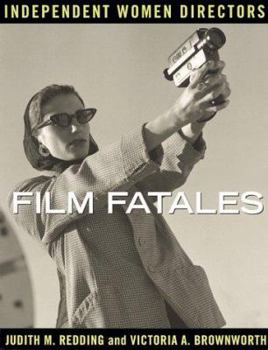Film Fatales: Independent Women Directors
Film Fatales offers a fascinating glimpse into the lives and work of women filmmakers. Profiled here are over thirty pioneering directors, producers, and distributors who have changed the face of... This description may be from another edition of this product.
Format:Paperback
Language:English
ISBN:1878067974
ISBN13:9781878067975
Release Date:November 1997
Publisher:Seal Press (CA)
Length:252 Pages
Weight:1.45 lbs.
Dimensions:0.7" x 7.0" x 9.0"
Customer Reviews
1 rating
REVIEW AS PUBLISHED IN IDFA MAGAZINE AMSTERDAM
Published by Thriftbooks.com User , 26 years ago
AT THE OTHER SIDE OF THE LENS 33 Female filmmakers portrayed and asked about their experiences in the film profession,which has been dominated by men for so long. By Rob van Scheers Towards the end of the film centennial women have managed to take up a position at the other side of the lens: no longer on screen only as actresses, but behind the camera, calling the shots. This generation in the post-feminist era is the subject of the book 'Film Fatales: Independent Women Directors'. Subdivided into four thematic sections (Documentary Film; Experimental Film; Narrative Film; Beyond the Director's Chair), the book has a pleasant, internationally oriented scope, also making it a crash course in 'female filmmakers from all corners of the world'. Most people are more or less familiar with successful directors like Susan Seidelman (US), Mira Nair (India), Jane Campion (New Zealand), Marleen Gorris (the Netherlands) and Patricia Rozema (Canada). Other faces are introduced by Judith M. Redding and Victoria A. Brownworth for the first time to an audience which exceeds the specialised in-crowd. Because it is almost always interesting to listen to craftspeople talking passionately about their profession, the relative obscurity of a number of them is not necessarily a drawback in this volume. PRAGMATIC Because of the context of the book, the reader obviously starts looking for the female filmmakers'shared experiences, other than the perpetual budgetary problems that are generally applicable to the independent film scene. (`When does a documentary filmmaker know that she is in Hollywood?' the American filmmaker Jessica Lu asked rhetorically, when she was there in 1996 to pick up an Academy Award for her film `Breathing Lessons: The Life and Work of Mark O'Brien'. The answer: `When her dress is more expensive than her film.') But just as a book about female authors or female (pop) musicians would result in a pandemonium of opinions, the female directors, both thematically and stylistically, appear to aim for a wide diversity. A sign of maturity, I would say,because unlike in the seventies, the filmmakers are no longer judged by the politically correct content of their utterances (and fortunately they are not steered in that direction by the interviewers). The pioneer work is largely behind them. `It's a good thing I was as naive as I was when I started,' Susan Seidelman (maker of films like `Smithereens', `Desperately Seeking Susan' and `She-Devil') says looking back. `I didn't realize how few women directors there were, how hard it was for women to do what men had been doing for years. (-) The good thing for me about the women's movement was I just thought I could do it, just go out and direct.' This is how pragmatic most of the filmmakers in this book turn out to be, an approach which has led to many a priceless piece of work in the past two decades. FEMALE LENS? Therefore, when reading this book, it is not easy to answer the question whether





